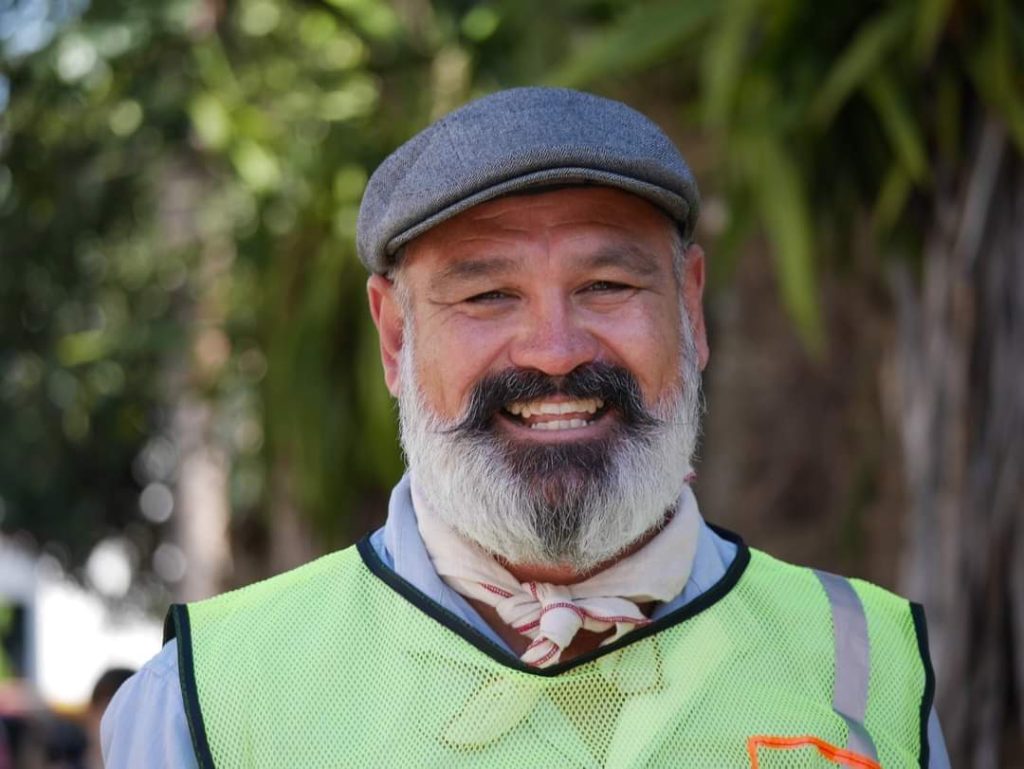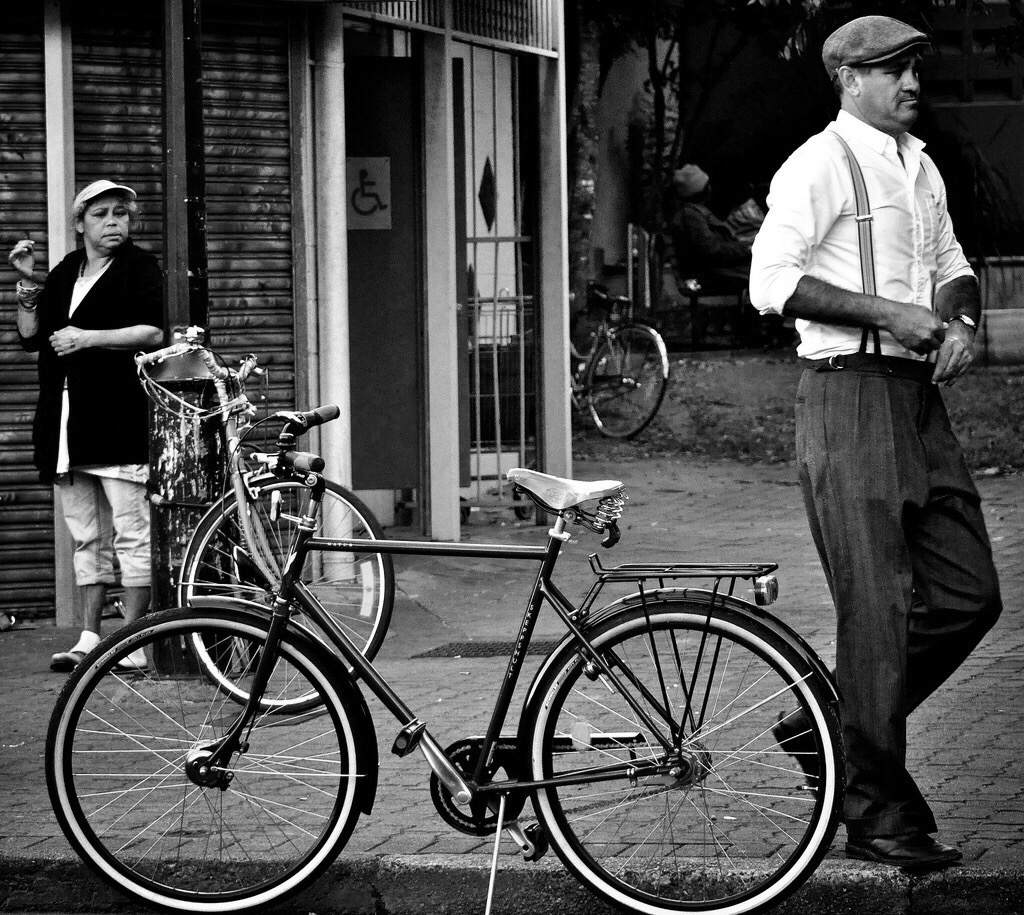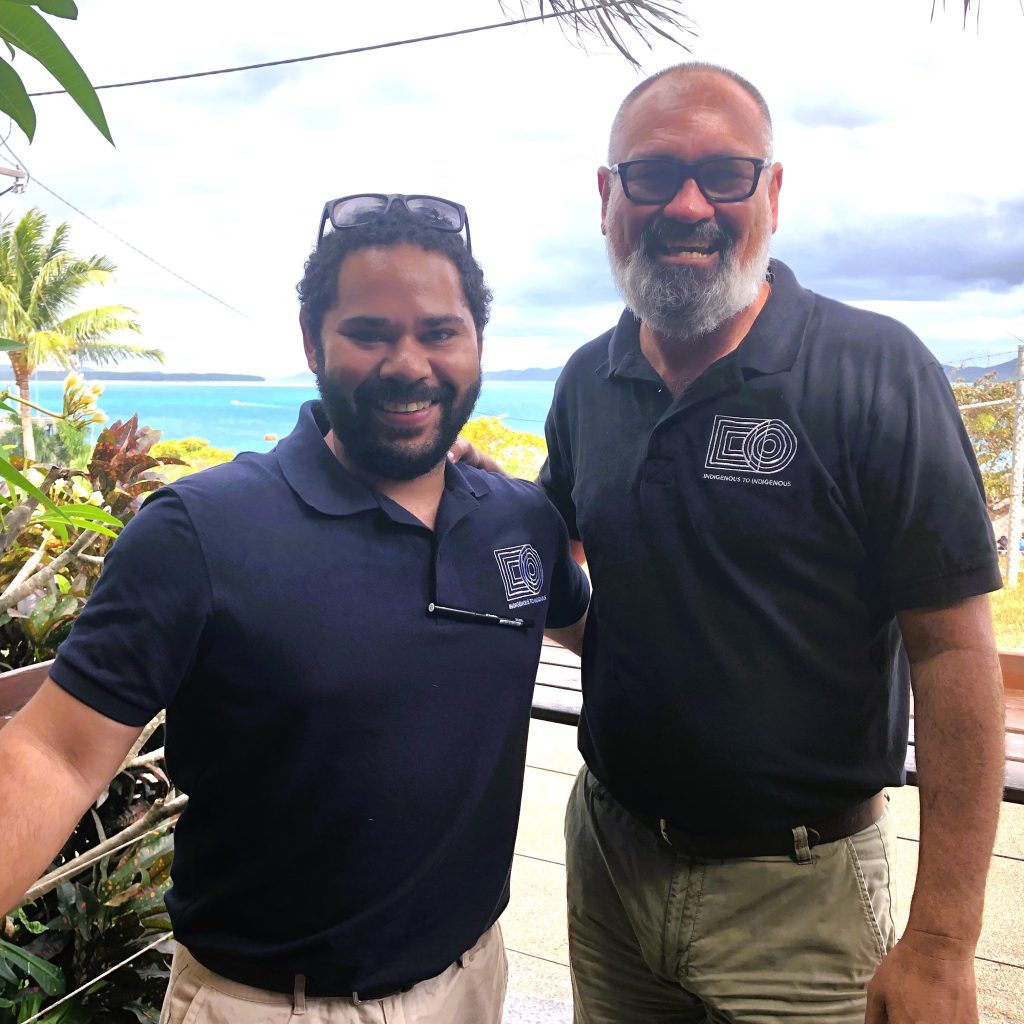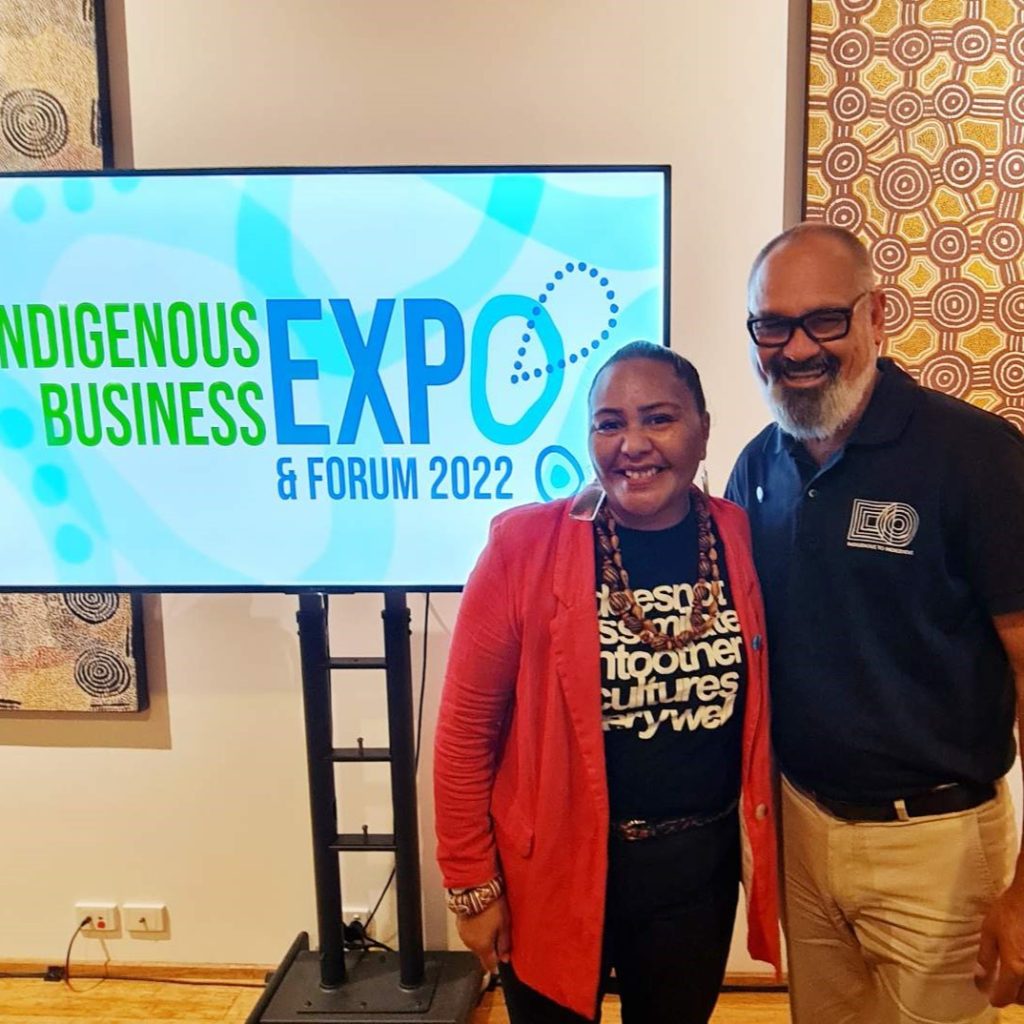Darren Godwell is a Kokoberren man from North Queensland. He grew up in Mt Isa and went to university in Brisbane, where he studied sport and psychology.
Darren first came to live in West End in 1989 to go to the Uni of Queensland.
Most West Enders probably know Darren Godwell best from his ten years on the executive for the West End Community Association (WECA), seven of those as its President. However, Darren has always been involved in other arenas: in Aboriginal education as the CEO of the Stronger Smarter Institute and, more recently, supporting Indigenous interests in business, investment, and trade as CEO of advisory company i2i Global.
Darren also serves on National Australia Bank’s Indigenous Advisory Group and is Co-Chair of the National Indigenous Reference Group to the Federal Minister for Indigenous Affairs.
You may also catch Darren as a regular commentator on the economy on the ABC News Breakfast.


Given his long involvement, I asked Darren about his motivation for getting involved as a volunteer with WECA and how that links with his larger vision for Aboriginal inclusion.
I moved back into West End in 2001 and believed in the importance of active community. For me, that meant, if I had the privilege of having the time and energy to spend, I wanted to spend it in ways that contributed. I wanted to give back to the community that had excited and enliven me as a university student.
In some way I was acknowledging that 4101 had given me so much. You go to community events, festivals and concerts on the streets that seem random. As if it just happens. But there’s always people organizing and helping make that happen and bringing it to fruition. And so, I recognized that if that were going to continue then I would like to contribute.
WECA has been involved community events, like Kurilpa Derby, West End Festival and then the West End Film Festival, and it has also had a very active role around developments and it has on occasion taken developers to court. What of WECA’s achievements during your tenure are you most proud?
I’m most proud of the way WECA became an enabler of activities that allowed people to connect. So, the Boundary St/West End Festival and Kurilpa Derby are very deliberate occasions that allow people to interact, to connect. WECA created physical space for that connection to happen as a place of celebration and positivity: a place of inclusion. So, for me, I’m most proud about having a small part in helping create those spaces that provided those 1000s of hours of people celebrating life, music and community while being out on the street in their neighbourhood.
Was there a vision that you would still like to see realised?
I’ll start with the most familiar, affirming part. Bunyapa Park came about solely because of the intervention of WECA. That park is a physical space which is non-commercial, open, and that in many ways is becoming a bit of the heart within the suburb. I’m most proud of WECA’s work and initiatives, which not only celebrate and contribute to the neighbourhood, but also protect the neighbourhood. You’ve got to defend what’s important to you.
It doesn’t just happen, and it doesn’t just stick around. If it’s threatened, you must be prepared to defend it. You make some conscious choices. If there’s an element of unfinished business, it’s in the incomplete work of our town planning, land uses and future uses of public lands and assets in our community. I’d put the case that Brisbane City Council needs to do better in its responsibilities as the regulator of those public spaces. That’s why every egregious piece of development, every egregious piece of construction that a for-profit company wants to dump into a community with little to no regard to the broader impact. How does that construction interact with the public space? How does it interact with our streets, our public spaces? How does it contribute to supporting human interactions? Does it make people more isolated? Does it make them less safe?
Where is Brisbane City Council on climate resilience? Is it continuing to approve more residential in flood plains? Does BCC approve buildings in flood-prone areas with little regard to emergency evacuation contingencies?
In times of disaster and trauma people draw down on that bank account of social capital. We need to protect those fundamental elements which allow people to connect, because it’s in the connections that we build social capital. And frankly, there is a direct link between the physical buildings and construction that city council is approving and our ability as a community to stay resilient, safe, and connected. So, if there’s unfinished business, it’s building connections for social capital and climate resilience.


You have said that the theme that’s run through your community involvement and your working life has been Aboriginal rights. Can you expand on that?
Professionally, I have had opportunities in all kinds of fields. I have been quite eclectic across my career. However, the common thread is my commitment to social justice for my own people – for Indigenous Australians. That personal value of social justice has found me operating in all kinds of spaces. I’m looking at how we reform institutions, so they are more inclusive of Indigenous Australians in our modern society.
Remember, the colonial project was about the theft of our lands, the destruction of our cultures and our knowledge. Against that colonial project, I’ve worked to reform institutions so that they are more inclusive of us as the original Australians.
My work as an Indigenous professional is trying to effect positive impact to support the agency of other Indigenous peoples. And so, working on structure and personal agency are the two elements of my approach. Whether that’s building and supporting Indigenous enterprises and ventures to become sustainable, with Indigenous leaders in control of their own money and resources and making choices, or whether that’s supporting Indigenous peoples and supporting plans and their development on-country.
How does that work in practice?
Most recently, I’ve been working in the for-profit sector, particularly in the space of International Affairs around economic development, with investment and trade matters.
Supporting the resumption of Indigenous interests in international affairs and trade finds outlet in a couple of specific areas. In the 234 years of Australian colonisation, the colonies of Australia have negotiated all kinds of trade arrangements: they’re part of the institutions. And in those 234 years, across all those trade arrangements, we have never once seen an agreement that’s had Indigenous inclusion. So, after 234 years, we’re negotiating for Indigenous Inclusions in Australian trade arrangements.
Think of Indigenous Affairs as public policy. It has been dominated by social policies. That was the original white colonial approach to Indigenous Australians. From that original setting whenever people engage with Indigenous Affairs, it’s usually in ‘deficit and disadvantage.’ Hence the logic for social policies to solve problems. I want to change this approach.
I’m advocating for a more balanced approach that gives equal weighting to economic policy as well as social policy.
Frankly, after 20+ years of ‘Closing the Gap’ the evidence is that a preoccupation with social policy is not delivering change. To resume lives of abundance on our own country, Indigenous peoples must return to lives of wealth and prosperity. That’s quite a challenging paradigm for non-Indigenous Australians.
Non-Indigenous Australia struggles to allow itself to imagine Indigenous people living in prosperity and wealth. Living lives of abundance on their own country. That’s a big challenge. As we think about a Voice, we should also be thinking about mindset change: paradigm shift. To move beyond a white Australian poverty of imagination.
How do we get people to see what is actually happening out there?
In some ways, Indigenous peoples are progressing light years ahead. Amongst ourselves many have resumed campaigns for respect and dignity on our own lands. Some as sovereign nations. And that’s why Treaties are coming.
Treaties will supersede today’s views of deficit and disadvantage.
In all kinds of places in the globe the notion of ‘disruption’ is welcomed and encouraged. We should do the same in Indigenous affairs.
We should welcome and celebrate the disruptive effect of Indigenous success in commerce and enterprise, investment, trade, and economic development.
Those conversations are being reported in mainstream and community media alike. Take the time to read those articles. To learn and to give yourself permission to listen.
What could we expect to see in the next 10 years?
You don’t need to wait for the next ten years; you can see it in the next 10 months. Part of the challenge of Indigenous Affairs is the popular belief that change is going to take a generation. And, honestly, that’s bullshit. We will not need to wait a generation to see change. Disruptive change doesn’t come at you through decades. It comes upon you fast, and it disrupts fast – as if out of nowhere. We’re going to see that happen in Indigenous interests in matters of trade and investment.
Can you provide an example?
If Australia and the European Union agree to Indigenous inclusions in the current trade arrangement for an indigenous fruit like Kakadu Plum, it would mean that every product that’s made by a global cosmetics giant, on the of shelves in Paris and Rome, that uses an indigenous botanical as the active ingredient, would have to prove the provenance of the ingredient back to Kakadu. If they couldn’t, then they wouldn’t be able to sell the product under that claim. Immediately, there’s several million dollars a year which is spent on manufacturing goods that use Kakadu Plum. A stroke of a pen in a free trade agreement could capture a multi-million-dollar Australian industry.
So, is it like France saying you can’t call your sparkling wine, champagne, unless the grapes are sourced from the champagne region of France?
Exactly. And it’s really that important. The focus on an indigenous botanicals in a commercial sense, is powerful at many levels, because 90 per cent of Indigenous knowledge on botanicals, and their use, is Indigenous women’s business. So that one inclusion would go immediately to supporting Indigenous women in the preservation of their law and culture on-country today. Effective immediately.
Is this happening in for Indigenous peoples in other countries.
Yes, Canada has made Indigenous inclusions a part of fair trade for many years. And trade arrangements are already in place in Canada and in the USA. They already guide Indigenous peoples as exporters. Then other countries open-up those channels for indigenous companies to export into other markets, as well as attracting investment capital.
The overwhelming value of investment capital into Australia goes into non-Indigenous enterprises. In fact, there’s no evidence of direct investment of capital from overseas into an Indigenous owned business to date. But, if we open avenues of capital investment into Indigenous controlled ventures it may enable them to self-finance their own development, independent of government, independent of the public purse. And that’s something massively powerful; suddenly Indigenous peoples are in the driver’s seat for their own development on their own country. That’s something that’s also quite disruptive, as an idea.

I’m interested in your work with the Adnyamathanha Peoples in South Australia in what is one of the premier tourist destinations for the state. How did that opportunity come about and where is it up to now?
I’ve recently had the honour of being the Chairman of the Board for the Wilpena Pound Resort in the Flinders Ranges. This is an incredible asset on the sacred and unceded lands of the Adnyamathanha peoples. I was asked to support the business towards profitability and to boost the social outcomes for the Indigenous peoples. We achieved that through some very important steps.
We appointed an all-Aboriginal Board of Directors, and I was the first Aboriginal Chairman of the company. We appointed the first ever Aboriginal General Manager. We paid each Yura staff member an allowance in recognition of their cultural knowledge. We rebuilt the tour fleet so more guests could join tours with Yura on their own country in unique experiences on-country. We lifted Indigenous employment. We promoted Yura staff into management roles. We spent more of our operating budget with Aboriginal suppliers and contractors. We secured a multi-million-dollar capital injection to prepare the resort for a future World heritage application to UNESCO. And we achieved a profit!
Some in West End have speculated to me that you might become involved in representative politics. Is this an ambition?
I see public service in elected office as an incredible honour. To support the people of your neighbourhood and city requires a level of dedication, love, and selflessness that few possess. I’m incredibly thankful to those women and men that take on representative duties – no matter their political persuasion. You never say never, but I wonder if that train has left the station for me already?
Darren you have a family, your partner Seleanah is the current President of WECA, and your son attends West End State School. What are your hopes for the future for your son and his friends as they reach adulthood?
I hope that he, and his friends, can grow up in a neighbourhood that loves them, cares for them, and makes time and space for all our children to know 4101 in all its fruity-ness, its uniqueness and weirdness. West End is generous enough for everyone.
Cover image Jan Bowman, other images supplied.


